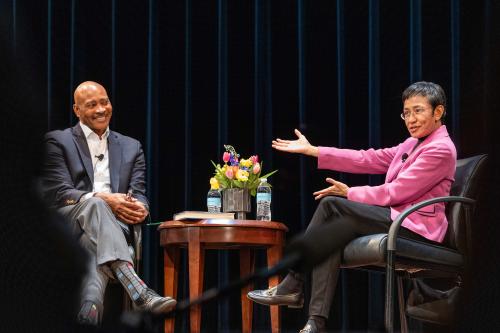

Written by Mary Daily
Ressa’s 38-year career has included two decades with CNN, where she was a “parachute reporter,” walking into countries on short notice to report on crises and opened the network’s bureaus in Manila and Jakarta. Then, she headed ABS-CBN, the largest news organization in the Philippines, overseeing a thousand journalists for six years. In 2012, she cofounded Rappler.com, an online news organization where she serves as CEO. Rappler is the top digital-only news site in the Philippines.
In the conversation with Buckley, Ressa, the first journalist to win the Nobel Peace Prize since 1935, described her fight against false reporting and corruption, which landed her in jail, and discussed the effect of Big Tech on journalism and democracy.
Despite her hardships and deep concerns about the future, she remained lively and ebullient as she talked with Buckley, a fellow journalist.
SOCIAL MEDIA VS. LEGACY NEWS
Describing the origin of Rappler, she said, “Around 2010, I felt a fundamental shift. Legacy news wasn’t shifting fast enough because digital was not giving enough revenues. Not only did I believe that social media would fundamentally change everything, but the internet was going to kill traditional media.”
She also felt that social media was the surest way to reach the 110 million Filipinos with a median age of 23. “I wanted to adapt the form and substance,” she said.
So, in 2012, she and three other ABS-CBN managers resigned and started Rappler. She went from managing 1,000 people to only 12. “Each of us had to do everything ourselves, but I believed in social media,” she said. “Social media for social good.”
GETTING IN TROUBLE
Buckley then asked about the year 2016, which was a turning point for Ressa and others when Rodrigo Duterte became president of the Philippines. Ressa was one of the first people to interview him.
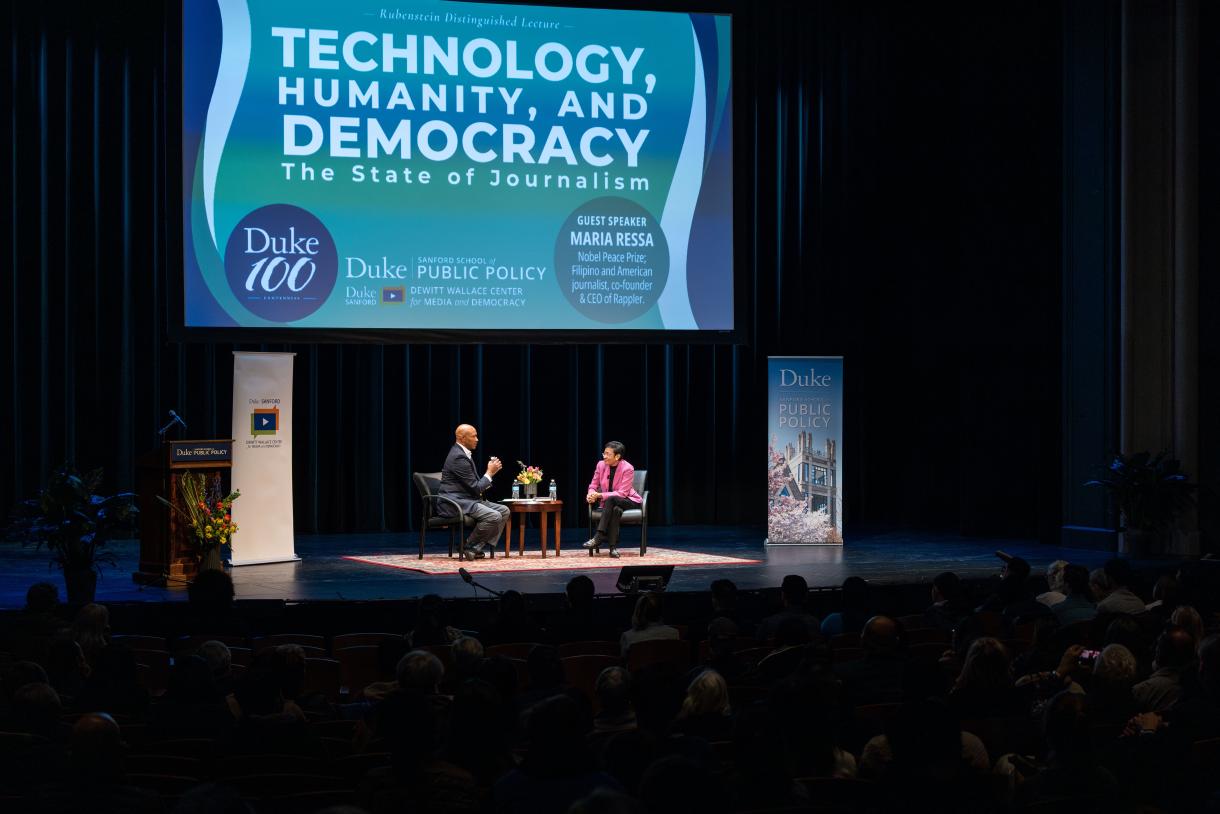
“Because we lived on social media at Rappler, we began to see the patterns [of corruption and disinformation] faster,” she said. Duterte told me directly that he was going to rule ‘with fear and violence.’”
The president began a brutal drug war that killed tens of thousands, yet the reported numbers of the dead kept shrinking. “No one to this day knows how many people were killed,” Ressa said.
Meanwhile, the team at Rappler worked even harder to report what the government was doing accurately and, as a result, suffered Duterte’s wrath, becoming one of three news organizations targeted by his regime with misinformation.
“People in the Philippines and Southeast Asia knew my reporting from CNN,” she said, “yet, in about six months, they began to think differently. ‘She’s not a good journalist. She’s corrupt.’ After all, you say the lie a million times, and (then) it’s a fact. That’s what social media has enabled.”
One evening, during a staff meeting at the Rappler headquarters, officials showed up to arrest Ressa. She spent the night in jail.
“That’s when I realized the world was upside down,” she said. “I knew we were doing the right thing. The super nice guy who arrested me said, ‘Please be patient with me. I’m just doing my job.’ The incentive structure is upside down. Our bureaucracies enable it. I began to realize that we were going to be tested. We’re going to have to come out.”
By the time she won the Nobel Prize in 2021, she had posted bail ten times and kept a lawyer on standby at her office in case Rappler was shut down. She was not allowed to leave the Philippines and was “starting to feel the walls closing in.” It was only after receiving the prize that she was permitted to travel again.
BIG TECH AS BIG BROTHER
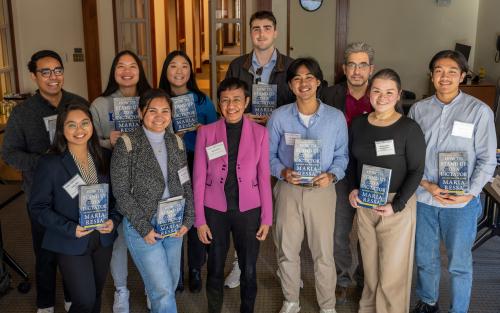
Ressa blames Big Tech for the spread of corruption and dishonesty, saying it “insidiously manipulates at the cellular level of democracy.” She cited an MIT study from 2018 that found that social media is designed to spread lies six times faster than truth to keep users scrolling.
“The more you keep scrolling,” she said, “the more revenues come in and the more data they get. They use machine learning to build a model of you that knows you better than you know yourself. Then they micro-target.”
“It’s the same whether it’s Facebook, now called Meta, or Twitter, now called X, or YouTube or Google or search itself. Journalism gets distributed through tech. And if tech puts its thumbs on the scale, not because it wants to elect anybody, but because it wants to make more money, then we have a problem.”
DEATH BY A THOUSAND CUTS
Buckley asked Ressa to elaborate on a phrase she uses often: “Democracies are dying a death of a thousand cuts.”
Saying politics has become a “gladiator sport,” she told how the Philippine government prevented her reporter from coming to the palace. “That’s a big gash,” she said, “but there are so many small cuts to the body politic that you’re bleeding out and will eventually die. It’s the gradual normalization of what wasn’t normal in the past. Our constitution has clearly drawn lines, but Big Tech comes in like a bulldozer and tries to move them. That is the beginning of authoritarian rule.”
In the face of this, she believes we should stick together and hold the line, refusing to give up our rights voluntarily. “But there are costs to doing that,” she said. “I went to jail.”
DEGRADATION OF NEWS
Messer told Buckley that social media has robbed 85 percent of the advertising that previously went to media. Meanwhile, “the blood bath in American media” has put many journalists out of work.
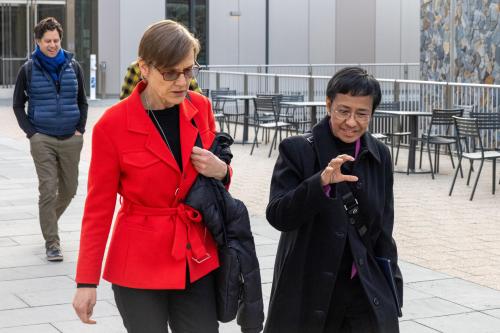
Legacy journalism has also lost its place as the gatekeeper for the public sphere. “We can create great journalism,” she said, “but it’s not going to get on your feed unless it’s incendiary. If you lace it with fear, anger, and hate, it will spread even more, but as journalists, we’re not going to do that. It’s not only the commodification of news but also the degradation of news.”
She praised how the EU has combatted disinformation, far ahead of U.S. efforts, passing a digital services act last year. In her Nobel acceptance speech, she compared this moment to the atom bomb, with manipulation and corruption “exploding unseen, unheard, in our information ecosystem.” A solution is to make tech companies transparent and accountable.
COMMUNITIES OF ACTION
Meanwhile, at Rappler, Ressa has found innovative ways to address some of these issues. She took the part of her budget designated for marketing and instead created a civic engagement arm. Citizen journalists report signs of corruption they see. The civic engagement teams go into schools to educate students about the dangers of corruption and climate change in the land of typhoons. Rappler formed a foundation that helps provide humanitarian aid while reporting natural disasters. “You don’t want to stick microphones in people’s faces,” she said, “when they need food and water.”
“We build communities of action,” she continued, “because the point of journalism is not to convince you to vote for one or the other, but to pull us together, to have the really difficult conversations that democracy needs, which requires not just speaking, but listening. That’s what I’ve always looked to America for,” she told Buckley. “Please don’t disappoint me.”
Buckley closed the evening by taking questions from the audience.
NOTABLE QUOTES
ON WHAT IT WAS LIKE TO BE ARRESTED
That’s when I realized the world was upside down. I knew we were doing the right thing. I spent the night in jail. That is when I realized the banality of evil. The super nice guy who arrested me said, “Please be patient with me. I’m just doing my job.’ The incentive structure is upside down. Our bureaucracies enable it. I began to realize that we’re going to be tested. We’re going to have to come out.
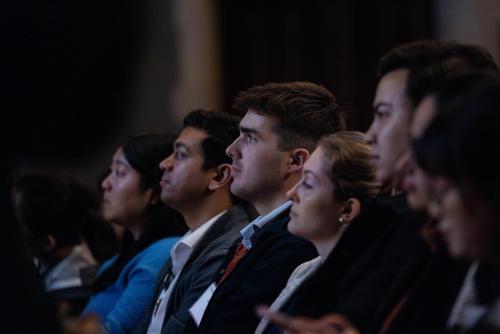
ON HOW WINNING THE NOBEL PEACE PRIZE CHANGED HER LIFE
Until then, I had to ask the courts for permission to travel because, at that time, I had posted bail ten times. I was beginning to feel the walls closing in. If one court out of ten said no, I couldn’t leave. That changed after the Nobel. Plus, my journalist friends from all over the world felt relieved. In the previous decade, we had gone through tremendous harassment, attacks, jailing, and killings. Every day, when we went to work, we had a lawyer there on standby in case we were shut down that day. We lived with this tremendous uncertainty.
ON HOW AUTHORITARIANISM STARTS
It’s the normalization of what wasn’t normal in the past. It’s death by a thousand small cuts that make you slowly bleed out. Norms are set and lines drawn and then Big Tech, a bulldozer, comes through, trying to move them.
ON HOW WE RESIST BEING OVERTAKEN
We link hands and hold the line. We’re not going to give up our rights voluntarily. But there are costs to doing that. I went to jail.
ON THE PURPOSE OF JOURNALISM
The point of journalism is not to convince you to vote for one or the other but to pull us together to have the really difficult conversations that democracy needs, which requires not just speaking but listening.
This lecture was a part of the DeWitt Wallace Center for Media and Democracy's 50th Anniversary, with generous support from the David. M Rubenstein Distinguished Lecture Series. David M. Rubenstein is a Duke alumnus and former chair of Duke's Board of Trustees. The David M. Rubenstein Distinguished Lecture brings high-profile thought leaders and policymakers to campus each year. Event partners for this lecture include the DeWitt Wallace Center for Media and Democracy, Sanford School of Public Policy, and American Grand Strategy and Duke Centennial. For questions about this event, please feel free to email sanfordevents@duke.edu.
Featured Video
Rubenstein Lecture | Nobel Peace Prize Winner Maria Ressa
Nobel Peace Prize winner, journalist, co-founder and CEO of Rappler, Maria Ressa, spoke about her thoughts on the intersection of fake news, freedom of expression, human rights, and where journalism is heading today. February 8, 2024
